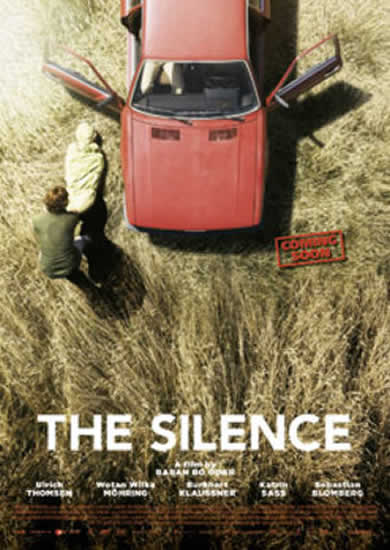 Swiss director Baran bo Odar’s debut feature is a gripping psychological crime film. Unlike most films in the genre, we know the perpetrators from the start but Intertwining character stories, an evocative sound design and off-beat cinematography keep us on the edge of our seats. Violence is kept off camera, but Odar is under our skin throughout. Friendship, complicity, perversion, grieving and guilt are the ingredients of this bleak film.
Swiss director Baran bo Odar’s debut feature is a gripping psychological crime film. Unlike most films in the genre, we know the perpetrators from the start but Intertwining character stories, an evocative sound design and off-beat cinematography keep us on the edge of our seats. Violence is kept off camera, but Odar is under our skin throughout. Friendship, complicity, perversion, grieving and guilt are the ingredients of this bleak film.
Odar sets his story in a summery Bavarian countryside, as if to underscore the frightening banality of crime and the number of criminals, hidden in plain sight, who often go undetected.
Germany, 1983. A sunny day. Two men drive down a country road through wheat fields. Clinical overhead shots increase the tension. (A similar aerial shot punctuates the film’s surprising finale.)
Seeing a young girl on a bike, their car backs up and follows her through the fields. The older man rapes and kills her, as his passive younger ‘accomplice’ watches from the car. They toss her bike into the field and dump her body.
Twenty-three years later. Odar introduces an ensemble of characters, all of whom are touched by twin crimes separated by decades.
While her ineffectual parents argue about who should discipline her, 13-year-old Sinikka Weghamm (Anna Lena Klenke) storms out, bikes to the carnival to meet friends. She vanishes. The next day, a local farmer finds a gym bag and a bloody rock in the same cornfield where the earlier crime took place took place.
David Jahn and superior officer Matthias Grimmer begin investigation when the town learns about Sinikka’s disappearance.
The news has profound psychological repercussions for a host of characters, each of them is haunted by the past, and most of them are dysfunctional. Only the disciplined practiced perpetrator seems to go about his business as usual.
Police disturb the troubled peace of Elena Lange (Katrin Saß “Good Bye Lenin!”) the mother of the first victim, Pia Lange, whose bedroom remains unchanged since her unsolved murder.
The police interview Sinikka’s distraught parents Ruth (Karoline Eichhorn) and Karl Weghamm (Roeland Wiesnekker). As the panicked parents pepper them with questions, the police treat it like a  missing person’s case, suggesting that, like most missing kids, Sinikka will probably come home. Grimmer insists on keeping them in the dark to benefit the investigation.
missing person’s case, suggesting that, like most missing kids, Sinikka will probably come home. Grimmer insists on keeping them in the dark to benefit the investigation.
Veteran police detective Krischan Mittich (Burghart Klaussner-“The White Ribbon”), who failed to solve the original crime, is retiring. Colleagues and former colleagues celebrate. The party sequence establishes antipathy between Krischan and his replacement Matthias Grimmer.
The news of the twin crime scene sets Krischan on a dogged search for closure. David Jahn (Sebastian Blomberg) recently rejoined the department after his wife’s death from cancer. Krischan believes he can link the crimes, and convinces David to try. Eccentric from grief David, his pregnant partner Jana Gläser (Jule Böwe) and retired Krischan, dig up the cold case, breaking police protocol at every turn.
A slow motion scene of children at play introduces successful architect and family man Timo Friedrich (Wotan Wilke Möhring). The newscast alerts Timo, sending him back to the scene of the crime. We realize he was the young accomplice.
Awakened, as if from a dream, successful Timo tracks down Peer to see if he committed the crime. Just as Timo disappeared into a new identity, Peer, a respected familiar local, remains hidden close at hand. The tenants of apartment complex where he works depend on him.
In flashback we follow timid college student Timo, who’s befriended by a local maintenance man Peer Sommer (Danish actor Ulrich Thomsen “Celebration”). On the park bench Peer noticed the way Timo stares at the young girls. Sensing another pedophile under the skin, he invites him back to his flat. He shows him a disturbing homemade bondage film, and eventually takes him on the fatal drive in which he hunts, rapes and murders Pia. Aroused and guilt ridden, Timo packs and jumps a bus out of town, burying his shame in a new identity.
Knowing the criminals identity increases the films irony, as procedure is foiled for a variety of reasons including departmental politics. In one scene, pregnant Jana Gläser is questioning Peer Sommer, holding evidence in her hands, when she’s recalled. Lucky for her, but not the case, as Peer holds a concealed knife close to her pregnant belly. In another scene, a guileless boy interrupts the reunited accomplices and asks if he can watch a video with them. (We know which one Peer prizes.)
We’re one step ahead of most characters, but Odar hold some surprises.
Cinematographer Nikolaus’ sunlit ambiance (color-graded to a fair-the-well). clever production design by Christian M. Goldbeck and Yesim Solan and an effective use of sound rachet up the subtext.
Adapted from writer Jan Costin Wagner’s 2007 novel “Das Schweigen” the script won the Frankfurt Book Fair Award for Best International Literary Film Adaptation in 2010. A GRIPPING ENTERTAINMENT

